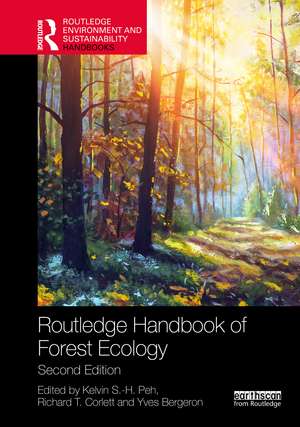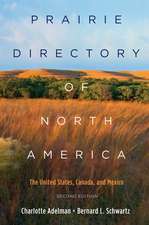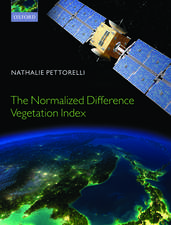Routledge Handbook of Forest Ecology: Routledge Environment and Sustainability Handbooks
Editat de Kelvin S.-H. Peh, Richard T. Corlett, Yves Bergeronen Limba Engleză Hardback – 7 oct 2024
This new edition has been fully revised and updated throughout to reflect the profound and unprecedented changes in both forests and climates since the publication of the first edition in 2015. The handbook reflects key developments in the field of forest dynamics and large-scale processes, as well as the changes that are now manifesting in different types of forests across the globe as a result of climate change. It covers both natural and managed forests, from boreal, temperate, sub-tropical and tropical regions of the world. In this second edition, the breadth of the handbook has been expanded with new chapters on mountain forests, monodominance, pathogens and invertebrate pests and amphibians and reptiles in forest ecosystems. Original author teams are complemented by the addition of new authors to offer fresh perspectives, and the second edition places greater emphasis on the applicability of each topic at a global level. The handbook is divided into seven parts:
• Part I: The forest
• Part II: Forest dynamics
• Part III: Forest flora and fauna
• Part IV: Energy and nutrients
• Part V: Forest conservation and management
• Part VI: Forest and climate change
• Part VII: Human ecology
The Routledge Handbook of Forest Ecology is an essential reference text for a wide range of students and scholars of ecology, environmental science, forestry, geography and natural resource management.
| Toate formatele și edițiile | Preț | Express |
|---|---|---|
| Paperback (1) | 445.41 lei 3-5 săpt. | +44.12 lei 7-13 zile |
| Taylor & Francis – 24 ian 2018 | 445.41 lei 3-5 săpt. | +44.12 lei 7-13 zile |
| Hardback (2) | 1370.78 lei 6-8 săpt. | |
| Taylor & Francis – 22 oct 2015 | 1370.78 lei 6-8 săpt. | |
| Taylor & Francis – 7 oct 2024 | 1580.81 lei 6-8 săpt. |
Din seria Routledge Environment and Sustainability Handbooks
- 8%
 Preț: 446.44 lei
Preț: 446.44 lei -
 Preț: 344.05 lei
Preț: 344.05 lei -
 Preț: 345.96 lei
Preț: 345.96 lei -
 Preț: 375.80 lei
Preț: 375.80 lei -
 Preț: 341.55 lei
Preț: 341.55 lei -
 Preț: 332.04 lei
Preț: 332.04 lei - 15%
 Preț: 427.16 lei
Preț: 427.16 lei -
 Preț: 355.44 lei
Preț: 355.44 lei - 9%
 Preț: 1350.07 lei
Preț: 1350.07 lei - 8%
 Preț: 445.41 lei
Preț: 445.41 lei - 26%
 Preț: 1359.11 lei
Preț: 1359.11 lei - 25%
 Preț: 1223.03 lei
Preț: 1223.03 lei -
 Preț: 449.41 lei
Preț: 449.41 lei - 15%
 Preț: 441.09 lei
Preț: 441.09 lei - 25%
 Preț: 352.95 lei
Preț: 352.95 lei - 27%
 Preț: 1229.98 lei
Preț: 1229.98 lei - 26%
 Preț: 1218.32 lei
Preț: 1218.32 lei - 26%
 Preț: 1189.60 lei
Preț: 1189.60 lei -
 Preț: 460.58 lei
Preț: 460.58 lei - 25%
 Preț: 1192.62 lei
Preț: 1192.62 lei - 11%
 Preț: 306.64 lei
Preț: 306.64 lei - 15%
 Preț: 483.15 lei
Preț: 483.15 lei - 26%
 Preț: 1187.85 lei
Preț: 1187.85 lei - 18%
 Preț: 1565.66 lei
Preț: 1565.66 lei - 15%
 Preț: 509.71 lei
Preț: 509.71 lei - 23%
 Preț: 410.54 lei
Preț: 410.54 lei - 26%
 Preț: 1356.60 lei
Preț: 1356.60 lei - 25%
 Preț: 1221.45 lei
Preț: 1221.45 lei - 18%
 Preț: 1558.26 lei
Preț: 1558.26 lei - 25%
 Preț: 1218.92 lei
Preț: 1218.92 lei - 11%
 Preț: 350.19 lei
Preț: 350.19 lei - 25%
 Preț: 1260.99 lei
Preț: 1260.99 lei - 18%
 Preț: 1563.17 lei
Preț: 1563.17 lei - 26%
 Preț: 1188.43 lei
Preț: 1188.43 lei -
 Preț: 356.63 lei
Preț: 356.63 lei - 25%
 Preț: 1220.17 lei
Preț: 1220.17 lei - 15%
 Preț: 507.27 lei
Preț: 507.27 lei
Preț: 1580.81 lei
Preț vechi: 1927.81 lei
-18% Nou
Puncte Express: 2371
Preț estimativ în valută:
302.49€ • 315.20$ • 250.46£
302.49€ • 315.20$ • 250.46£
Carte tipărită la comandă
Livrare economică 03-17 aprilie
Preluare comenzi: 021 569.72.76
Specificații
ISBN-13: 9781032348384
ISBN-10: 1032348380
Pagini: 720
Ilustrații: 260
Dimensiuni: 174 x 246 mm
Greutate: 1.34 kg
Ediția:2
Editura: Taylor & Francis
Colecția Routledge
Seria Routledge Environment and Sustainability Handbooks
Locul publicării:Oxford, United Kingdom
ISBN-10: 1032348380
Pagini: 720
Ilustrații: 260
Dimensiuni: 174 x 246 mm
Greutate: 1.34 kg
Ediția:2
Editura: Taylor & Francis
Colecția Routledge
Seria Routledge Environment and Sustainability Handbooks
Locul publicării:Oxford, United Kingdom
Public țintă
Postgraduate, Undergraduate Advanced, and Undergraduate CoreCuprins
1. Introduction Kelvin S.-H. Peh, Yves Bergeron and Richard T. Corlett Part 1: The Forest 2. Boreal Forests Jean-Pierre Saucier, Ken Baldwin, Pavel Krestov and Torre Jorgenson 3. Temperate Forests Lee E. Frelich and Rebecca Montgomery 4. Subtropical Forests Richard T. Corlett and Alice C. Hughes 5. Tropical Forests Richard T. Corlett 6. Temperate and Boreal Mountain Forests Christopher Carcaillet and Peter Z. Fulé Part 2: Forest Dynamics 7. Insect Disturbances in Forest Ecosystems Dan Kneeshaw, Brian R. Sturtevant, Barry Cooke, Timothy Work, Deepa Pureswaran, Louis DeGrandpre and Dave MacLean 8. Fire in Forest Ecosystems David F. Greene, Madeleine A. Lopez and Sean T. Michaletz 9. Ecological Effects of Strong Wind on Forests Stephen M. Turton and Mohammed Alamgir 10. Forest Succession and Gap Dynamics Rebecca Montgomery and Lee E. Frelich 11. Tree Genetic Diversity and Gene Flow in Forest Ecosystems Francine Tremblay 12. Monodominance in Tropical Lowland Forests Kelvin S.-H. Peh Part 3: Forest Flora and Fauna 13. The Ecology of Lianas and Their Increasing Influence in Tropical Forests Stefan A. Schnitzer 14. Vascular Epiphytes in Forest Ecosystems Amanda Taylor 15. Insects in Forest Ecosystems Andrea Battisti 16. Bryophytes in Forest Ecosystems Nicole J. Fenton, Kristoffer Hylander Emma Pharo and Charles E. Zartman 17. Lichens in Forest Ecosystems Per-Anders Esseen, Göran Thor and Darwyn Coxson 18. Mammals in Forest Ecosystems Richard T. Corlett and Alice C. Hughes 19. Ecology and Conservation of Forest Birds Malcolm C.K. Soh, Ding Li Yong, Richard T. Corlett and Kelvin S.-H. Peh 20. Amphibians and Reptiles of Forest Ecosystems David Bickford, Adrian Garda, Seshadri K.S, Umilaela Arifin, Hiral Naik, Hanyeh Ghaffari and Barbod Safaei-Mahroo 21. Global Patterns of Biodiversity in Forests Christine B. Schmitt and João de Deus Vidal Jr. Part 4: Energy and Nutrients 22. Mycorrhizal Symbiosis in Forest Ecosystems Leho Tedersoo 23. Biogeochemical Cycling David Paré, Daniel Markewitz and Håkan Wallander 24. Forest Hydrology André St-Hilaire 25. Primary Production and Allocation in Forest Ecosystems Frank Berninger and Kelvin S.-H. Peh Part 5: Forest Conservation and Management 26. Natural Regeneration after Harvesting Nelson Thiffault, Lluís Coll, Douglass F. Jacobs, Marie Ange Ngo Bieng and Eliott Maurent 27. Tropical Deforestation, Forest Degradation and the Role of REDD+ in Climate Change Mitigation John A. Parrotta 28. Restoration of Forest Ecosystems John A. Stanturf 29. Forest Fragments and Fragmentation Michael David Pashkevich, Badrul Azhar, Damayanti Buchori, Robert J. Fletcher, Jr., Jake L. Snaddon and Edgar C. Turner 30. The Ecology of Logged Forests Paul Woodcock, Panu Halme and David P. Edwards 31. Pollution in Forests Mikhail V. Kozlov and Elena L. Zvereva 32. Biological Invasions in Forests and Forest Plantations Marcel Rejmánek 33. Pathogens and Invertebrate Pests in North American Forest Ecosystems Sandy M. Smith and Louis Bernier Part 6: Forest and Climate Change 34. Fire and Climate: Using the Past to Predict the Future Marion Lestienne, Justin Waito, Chéïma Barhoumi, Laurent Bremond, Martin P. Girardin, Jacques C. Tardif, Adam A. Ali, Hermann Behling, Julia Unkelbach and Christelle Hély 35. The Ecological Consequences of Droughts in Forests Richard T. Corlett 36. From Wood Formation to Tree Ring: How Tree Growth Responds to Climate Change Roberto Silvestro, Minhui He, Jian-Guo Huang and Hubert Morin and Sergio Rossi 37. Plant Movements in Response to Rapid Climate Change Richard T. Corlett 38. Forest Carbon Budgets and Climate Change Yadvinder Malhi, Tina Christmann, Xiongjie Deng, Huanyuan Zhang-Zheng, Sam Moore and Terhi Riutta Part 7: Human ecology 39. Multiple Roles of Non-timber Forest Products in Ecologies, Economies and Livelihoods Charlie M. Shackleton 40. Agriculture in the Forest: Ecology and Rationale of Shifting Cultivation Olivier Ducourtieux 41. Indigenous Forest Knowledge Hugo Asselin 42. Wild Meat Hunting in Tropical Forests Julia E. Fa and Stephan M. Funk
Notă biografică
Kelvin S.-H. Peh is an associate professor of conservation science in the Faculty of Environmental and Life Sciences, University of Southampton, UK.
Richard T. Corlett is an Emeritus professor at the Xishuangbanna Tropical Botanical Garden, Chinese Academy of Sciences, Yunnan, China, and an honorary research fellow at the Royal Botanic Gardens, Kew, UK. He was previously a professor at the National University of Singapore and the University of Hong Kong, China.
Yves Bergeron is an Emeritus professor of forest ecology and management at Université du Québec en Abitibi- Témiscamingue and Université du Québec à Montréal, Canada.
Richard T. Corlett is an Emeritus professor at the Xishuangbanna Tropical Botanical Garden, Chinese Academy of Sciences, Yunnan, China, and an honorary research fellow at the Royal Botanic Gardens, Kew, UK. He was previously a professor at the National University of Singapore and the University of Hong Kong, China.
Yves Bergeron is an Emeritus professor of forest ecology and management at Université du Québec en Abitibi- Témiscamingue and Université du Québec à Montréal, Canada.
Descriere
This edition has fully revised and updated to reflect the profound and unprecedented changes in both forests and climates since the first edition. It reflects key developments in the field of forest dynamics and large-scale processes, as well as the changes that are now manifesting in different types of forest across the globe.
Recenzii
"...the Routledge Handbook is an accomplished book and was a great pleasure to read. Its greatest strength is its modernity and the way in which disparate topics are linked through common themes of climate change and disturbance, which is then concluded very succinctly in the final three sections. This binds all the chapters together and provides continuity throughout such a large subject as forest ecology. In all it was difficult to find fault with the book, and ultimately I can highly recommend it to students, postgraduates, teachers and researchers alike. I imagine it could become a standard text for students in this field, and I will certainly be using it as a reference text for topics I am less well versed in." - Michael J.W. Boyle, Imperial College London, UK, in International Forestry Review (2016).
"This is a weighty tome in every sense. It aims to provide a 'state of the art summary of our current knowledge of forest ecology' from a variety of perspectives, production, conservation recreation, and across a wide range of forest biomes with over 80 contributors... I think it succeeds surprisingly well, given the spread of its subject matter. It does provide a framework for understanding the different topics covered by the chapters, that you cannot get just from running a search for papers in Google Scholar or Web of Science." - Keith Kirby, in Bulletin of the British Ecological Society (October 2016).
"Forests have a multitude of resources (timber, non-timber plants, wildlife, water retention/erosion control, carbon sequestration, amelioration of climate, recreation, and inspiration); yet, at times, these may be incompatible. The key goals of this book are to help the reader gain the ability to understand forest ecology and a wider awareness of many forest values. The work offers detailed sections on forest biomes, forest dynamics, flora and fauna, forest biodiversity, energy and nutrient cycling, conservation and management, forests and climate change, and human interaction in forests (including agriculture, indigenous knowledge, recreation, hunting, and urban forests). Overall, the 44 chapters, written by 86 scholars, provide reliable information on forest ecological requirements, as well as on management needs. In the introduction, the editors write, “This handbook aims to act as a state-of-the-art summary of our current knowledge of forest ecology.” As such, it succeeds. This title will be of interest to laypersons as an introduction to forest ecology. For the graduate student, it provides extensive coverage of current research and excellent bibliographies. Summing Up: Highly recommended. Lower-division undergraduates through graduate students." - C. G. Heister, Yale University, in CHOICE (November 2016)
"This is a weighty tome in every sense. It aims to provide a 'state of the art summary of our current knowledge of forest ecology' from a variety of perspectives, production, conservation recreation, and across a wide range of forest biomes with over 80 contributors... I think it succeeds surprisingly well, given the spread of its subject matter. It does provide a framework for understanding the different topics covered by the chapters, that you cannot get just from running a search for papers in Google Scholar or Web of Science." - Keith Kirby, in Bulletin of the British Ecological Society (October 2016).
"Forests have a multitude of resources (timber, non-timber plants, wildlife, water retention/erosion control, carbon sequestration, amelioration of climate, recreation, and inspiration); yet, at times, these may be incompatible. The key goals of this book are to help the reader gain the ability to understand forest ecology and a wider awareness of many forest values. The work offers detailed sections on forest biomes, forest dynamics, flora and fauna, forest biodiversity, energy and nutrient cycling, conservation and management, forests and climate change, and human interaction in forests (including agriculture, indigenous knowledge, recreation, hunting, and urban forests). Overall, the 44 chapters, written by 86 scholars, provide reliable information on forest ecological requirements, as well as on management needs. In the introduction, the editors write, “This handbook aims to act as a state-of-the-art summary of our current knowledge of forest ecology.” As such, it succeeds. This title will be of interest to laypersons as an introduction to forest ecology. For the graduate student, it provides extensive coverage of current research and excellent bibliographies. Summing Up: Highly recommended. Lower-division undergraduates through graduate students." - C. G. Heister, Yale University, in CHOICE (November 2016)












